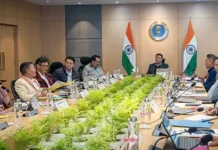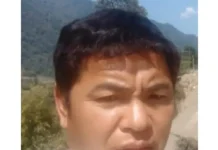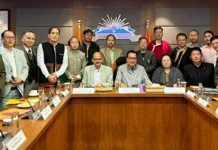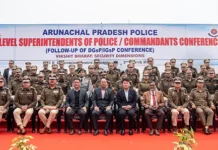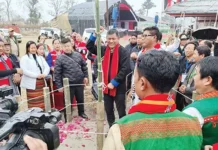[Nani Bath]
The epicentre of the ‘political earthquake’, reportedly released by Takam Pario and his supporters, is in Itanagar, but its tremor is being felt as far as in 28-Likabali assembly constituency. The outcome of the current political manoeuvring is likely to have a direct bearing on the by-election’s result.
Till the delimitation of assembly constituencies in 1990, Likabali was a part of 17-Basar constituency. Tomo Riba was elected twice in 1978 and 1980 on PPA tickets. He defeated Todak Basar, who was elected in 1984 as Congress candidate, in those two elections.
In 1990, after the Likabali assembly constituency was created, Rima Taipodia was elected on a Janata Dal ticket. In the subsequent election in 1995, Rima Taipodia was defeated by Kardu Taipodia, a Congress nominee. Rima Taipodia was elected again in 1999. Jomde Kena, who was elected thrice – in 2004, 2009 and 2014 – represented the constituency till his death.
Kardo Nyigyor is the BJP nominee in the by-election to the 28-Likabali assembly constituency, which has been scheduled to be held on 21 December, 2017. He is believed to have been blessed by the family of late Jomde Kena, former cabinet minister (Health and Family Welfare). This by-election was necessitated because of Jomde’s untimely demise.
In a surprise move, the PPA announced the candidature of Gumke Riba, a State BJP executive member, who till the other day was hopeful of getting the BJP ticket. There seems to be no disputing the fact that he was the man squarely responsible for making the party (BJP) “what it is today” in Likabali constituency – from scratch to the best performing Mandal in the state.
A Reverend of Christian Baptist denomination, Modam Dini, stands as the candidate of the Indian National Congress. Sengo Taipodia, who became very popular in the movement for Lower Siang district, is contesting as an independent candidate.
Tapak Nguso (Lendo), considered a close confidant of Kiren Rijiju, who has been associated with the BJP since 2004, was one of the aspirants for the ruling party ticket. Tapak basically hails from Chisi village of Basar assembly constituency. He has the experience of serving as the district president (West Siang), as secretary of the State BJP, and is presently national executive member (ST Morcha).
Tapak Nguso’s candidature was not recommended by the Likabali Mandal because “being a non-domicile of 28-Likabali assembly constituency, he is yet to understand the political dynamics and lacks in acquaintance/experience with the local public of the area. Candidature of a non-domicile will adversely affect public sentiments as well as ruin the morale of our party cadres.”
The recommendation of the president of the BJP’s 28th Likabali Mandal was unambiguous, that “Sri Gumke Riba commands immense favour, sympathy and popular support across all sections of the society.” He adds, “…also has every chance of being elected unopposed if he is awarded the ruling party ticket as he commands huge support and sympathy cutting across party affiliations.”
Congress candidate, Modam Dini, is a popular spiritual leader. He may be trying to capitalise on being a religious head, but it may not be easy to garner support on religious lines in a clan-oriented society. Tribal communities, irrespective of religious colours, are deeply rooted to their families, clans, and lineages.
Still, we cannot rule out ‘political unity’ on the basis of religious affiliations. There are some orthodox religious individuals/families who consider certain activities of the sangh parivar as anti-Christians. A Christian believer points out, “The BJP has ambulance for cows in Uttar Pradesh but no ambulance for humans in Arunachal Pradesh.”
I was a bit disturbed by a revelation of one of my colleagues that “Christians are praying hard to get honest people elected for the good of the society.” Modam may try to project his image in this line of thinking.
Many believe that Sengo Taipodia’s candidature was prompted by a possibility that Tapak Nguso had a better chance to be given the BJP ticket. Being a non-domicile and having connection only in Gensi circle, Tapak would not be able to have any influence in the foothill areas. Sengo Taipodia is from Likabali circle, which accounts for around 50 per cent of the total electorate.
There are 10,608 voters in total. Gensi and Sibe circles have voters close to 3,500. The foothill areas (Likabali and Kangku circles) have voters slightly more than 7,000.
Kangku circle comprises of 24 villages. It was in the news recently because of the villagers’ stand of ‘No Road: No Vote’. Their grouse against their representative is that they become ‘minority in their own land’ owing to the absence of road communication. Even if Assamese villagers encroach upon their land or exploit natural resources, they are unable to raise their voices since they cannot go out without touching Assam.
Jomde Kena, who hailed from Gensi, represented this constituency for almost 15 years. One voter says that Kena was least interested in the development of the foothills, not being a native of the areas. However, there are some who consider him a ‘pragmatic’ man who knew the arithmetic of electoral politics and the behaviour of the voters more than anyone else. He knew that at the end of the day it was finances that would matter.
There are apprehensions that the perpetual policy of ‘underdevelopment of the foothills’ adopted by Jomde Kena may continue if Kardo Nyigyor, once his close associate, gets elected. Gumke Riba, the PPA candidate, is reaping the maximum benefits out of this debate of insider versus outsider.
How did Kardo Nyigyor get the BJP nomination if his name was not recommended by the Likabali Mandal? This is a politically significant question to which everyone is looking for the right answer.
There are rumours doing the rounds about exchange of money in lieu of a BJP ticket. This may be an exactly true or a precisely false propaganda being spread by opponent camps. The BJP candidate is said have filed a defamation suit against a police officer for spreading politically damaging rumours.
Gumke Riba is a senior community leader besides being an old timer in the BJP before his resignation. If he is elected on a BJP ticket, he throws a direct challenge to leaders like Gojen Gadi (MLA Basar) in terms of seniority in the party and the district. So, “Is it not possible that Gojen spoke against Gumke’s candidature to the chief minister with a threat to withdraw his support?” asked an insider of the PPA camp.
His assessment looks quite logical, given the political situation in the state today. Kiren Rijiju, too, in his Facebook message to his supporters, indicated that Gumke Riba did not get BJP because of the prevailing political situation.
My sources have confirmed that Takam Pario is inviting ‘new BJP’ legislators to his camp with the promise of confirmed Congress or PPA ticket in the 2019 general elections.
The BJP is considered to be a cadre-based party. As such, many of the incumbent BJP MLAs may be sidelined in favour of senior party members. Certainly, young leaders like Nyamar Karbak (MLA Liromoba), a new entrant in the BJP, may like to put all his might to dismantle cadre-based system in the BJP in Arunachal Pradesh.
“They did succeed,” a senior BJP leader says, when two-month-old BJP member, Kardo Nyigyor, was given the BJP ticket. While some others maintain that the party ticket given to him was just the fulfilment of the promises made by the chief minister and the party president to the family of late Jomde Kena.
There could be three politically significant remarks in relation to the just-concluding Likabali by-elections. One, the 2019 general election is going to be a repetition of this by-election. Secondly, ‘GR’ (Gumke Riba) and Kiren Rijiju are parts of the collateral damage unleashed by the power struggle going on presently in the state. Supporters of Gumke Riba are pointing their fingers at Kiren Rijiju, the BJP MP, for his inability to protect his ‘all-weather’ supporters.
Lastly, it is the success of power politics at the cost of the party’s ideology and discipline. Eventually, the indigenous movement in the state is going to be the first casualty, basically because the BJP’s old-timers are mostly those who are associated with various indigenous religious groups.

